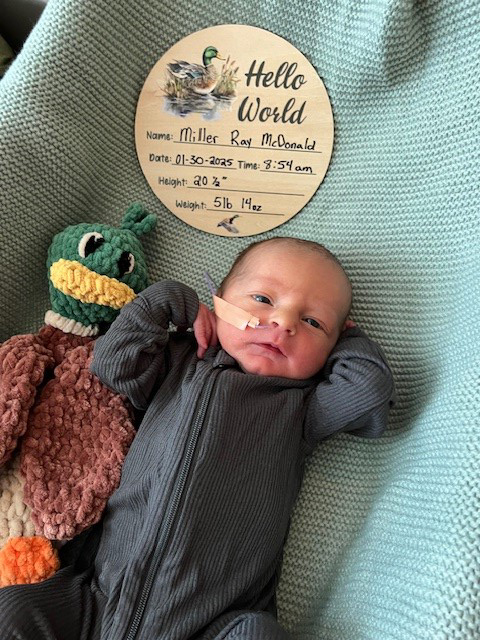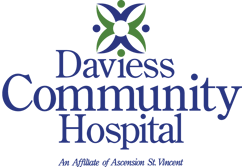Miller’s Story: How SALSA Helped a Preterm Newborn Breathe Easier
- Category: CORE, DCH, Foundation, Glory, Sleep Lab, Obstetrics & Maternity Services, Acute Care Unit
- Posted On:

Premature birth can be scary for parents and babies alike. When a baby arrives earlier than expected, a host of complications can arise, particularly with their still-developing lungs. That’s where an exciting, innovative technique called SALSA (Surfactant Administration via Laryngeal Mask or Supraglottic Airway) comes into play.
Meet Miller Ray McDonald
On January 30, baby Miller Ray McDonald made his entrance into the world at just 35 weeks. His parents, Logan and Allie McDonald, were overjoyed to meet their newborn son—but they also knew he might need extra care because Allie’s high blood pressure had led to an early induction, and Miller’s heart rate had been dropping.
Upon delivery, Miller weighed 5 pounds, 14 ounces and measured 20.5 inches. Despite being strong overall, the medical team quickly noticed that Miller’s lungs were not fully developed, and he required respiratory support soon after birth.
“He came out panting and breathing fast,” Allie shared. “That told us he needed respiratory support right away.”
What Is SALSA and Why Is It Important?
SALSA—or Surfactant Administration via Laryngeal Mask or Supraglottic Airway—is a modern method of delivering surfactant to a newborn’s lungs in a less invasive way. Surfactant is a vital substance that helps keep the tiny air sacs in the lungs open, reducing the effort it takes for a preterm baby to breathe.
- Why Surfactant Matters: Premature babies often struggle to produce enough surfactant on their own. Without it, their lungs can collapse more easily, leading to respiratory distress.
- How SALSA Helps: Instead of placing the baby on a more advanced ventilator or immediately transferring them to a higher-level neonatal unit, the SALSA technique makes it easier to give surfactant to the baby using a specially placed airway device.
This minimally invasive approach can often help a baby avoid intubation or reduce the amount of oxygen support required, letting parents and newborns stay closer to home for care.
Miller’s Progress
Miller’s care was guided by Miranda K. Schneider, FNP-C, NNP-BC, Pediatric Hospitalist, Neonatal Nurse Practitioner, and Level II Nursery Coordinator at Daviess Community Hospital, along with Troy Graber, RRT, MBA, Cardiopulmonary Manager. Together, they performed the first SALSA procedure at Daviess Community Hospital (DCH).
What happened after SALSA?
- Miller started on 40% oxygen.
- Within 24 hours, he dropped to 30% oxygen.
- By day three, Miller was on 25% oxygen, showing a steady improvement in his ability to breathe on his own.
“After the SALSA procedure, we saw his oxygen levels begin to improve,” Allie said. “The difference in his breathing was evident within 24 hours.”
Benefits of Keeping Care Local
Before DCH introduced SALSA, a preterm baby needing surfactant would typically be transferred to a Level III NICU in a larger hospital miles away. Now, with the ability to administer surfactant onsite, families like the McDonalds can stay together during those critical early days.
What does this mean for parents?
- Less Stress: Avoiding a long transfer to a bigger facility helps minimize stress for both parents and baby.
- Support System Nearby: Parents are able to keep local friends and family close while their newborn is being cared for.
- Continuity of Care: Families can stick with the medical providers they know and trust without added travel.
The Team Behind the Technique
The successful use of SALSA at DCH is the result of a dedicated effort by a specialized team. In the fall of 2024, Schneider, Graber, and Chelsea Stoll, RN attended a Neonatal Resuscitation Symposium and Workshop, where they learned the technique firsthand. Returning home, they trained respiratory therapists and OB nurses, officially bringing this cutting-edge neonatal procedure to southwest Indiana.
Words of Gratitude
Allie McDonald praised everyone involved in Miller’s care, especially Miranda Schneider, Allison Krieger, FNP-C, and the Women’s Health Center nurses:
“If we decide to have another child, we will definitely come to DCH again. The entire hospital staff has been so friendly and truly amazing.”
Looking Ahead
With the success of Miller’s SALSA procedure, Daviess Community Hospital has taken an important step forward in meeting the needs of premature infants closer to home. This community-centered approach underscores the hospital’s commitment to compassionate, advanced care for families in the region.
Want to Learn More?
If you’re interested in learning more about the SALSA technique, neonatal services, or OB/GYN care at DCH, please visit dchosp.org or call (812) 254-2760.




